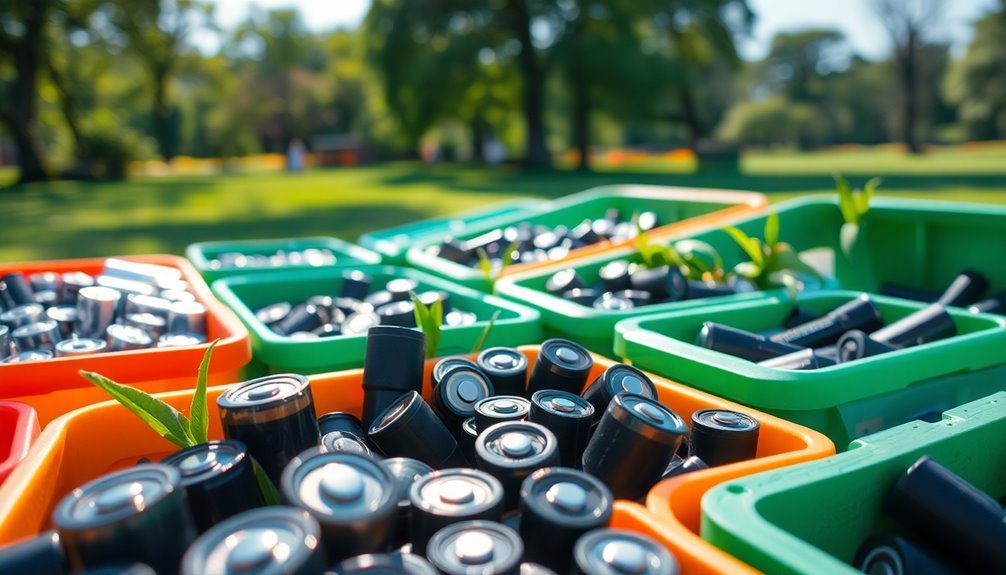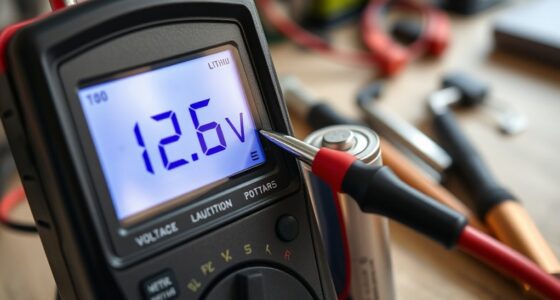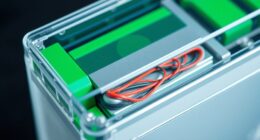Disposing of batteries properly is essential for both your safety and the environment. Start by identifying the type of battery you have—whether it's rechargeable, alkaline, or lead-acid. Many retailers, like Best Buy and Home Depot, offer drop-off programs for recycling. Don't forget to tape terminals on lithium-ion batteries to prevent hazards. Always follow local regulations and take advantage of community recycling events to keep harmful chemicals from leaking into the soil and water. By doing this, you're not only protecting your community but also conserving valuable resources. Stick around to discover even more eco-friendly disposal tips.
Key Takeaways
- Identify the type of battery you have to determine the correct disposal method, as different batteries have specific guidelines.
- Utilize local recycling centers or retailer take-back programs for safe disposal of rechargeable and hazardous batteries.
- Tape the terminals of lithium-ion and other batteries before disposal to prevent short-circuiting and fire risks.
- Check local regulations and participate in community recycling events to ensure proper disposal and reduce environmental impact.
- Avoid mixing different battery types and never throw batteries in regular trash to prevent contamination and safety hazards.
Types of Batteries
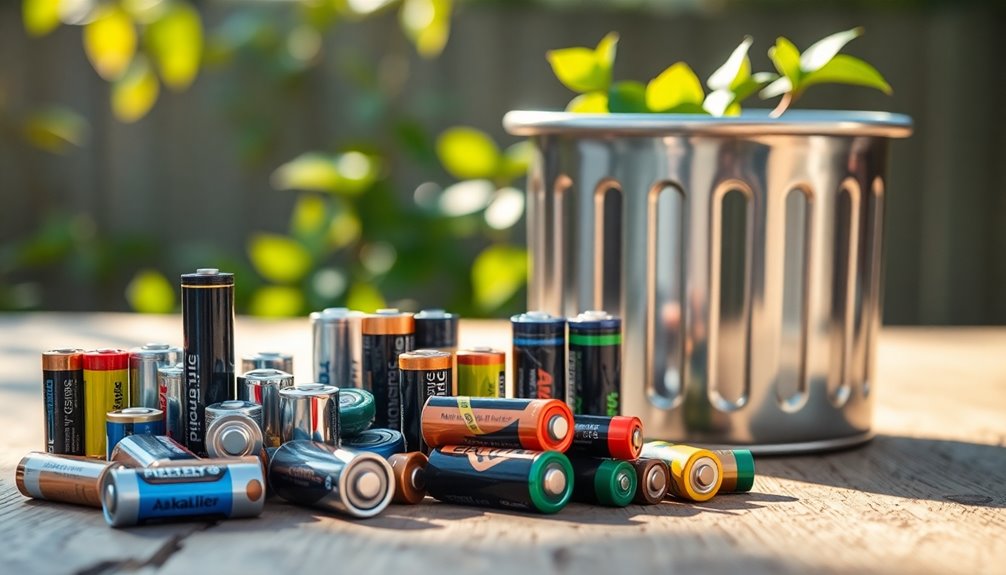
Batteries power our everyday devices, and understanding the different types is essential for proper disposal.
You'll encounter two main categories: primary cells, which are non-rechargeable, and secondary cells, which are rechargeable. Common primary batteries include alkaline, zinc-carbon, and lithium.
Alkaline batteries are often considered nonhazardous and can typically go in your regular trash. However, button cell batteries contain hazardous materials and require recycling.
On the other hand, secondary cells like lithium-ion and nickel-metal hydride can be reused but need special handling due to potential environmental hazards.
Finally, lead-acid batteries from vehicles must be taken to specialized recycling facilities to prevent contamination.
Knowing these different types of batteries helps you make environmentally friendly choices for disposal.
Safe Disposal Methods
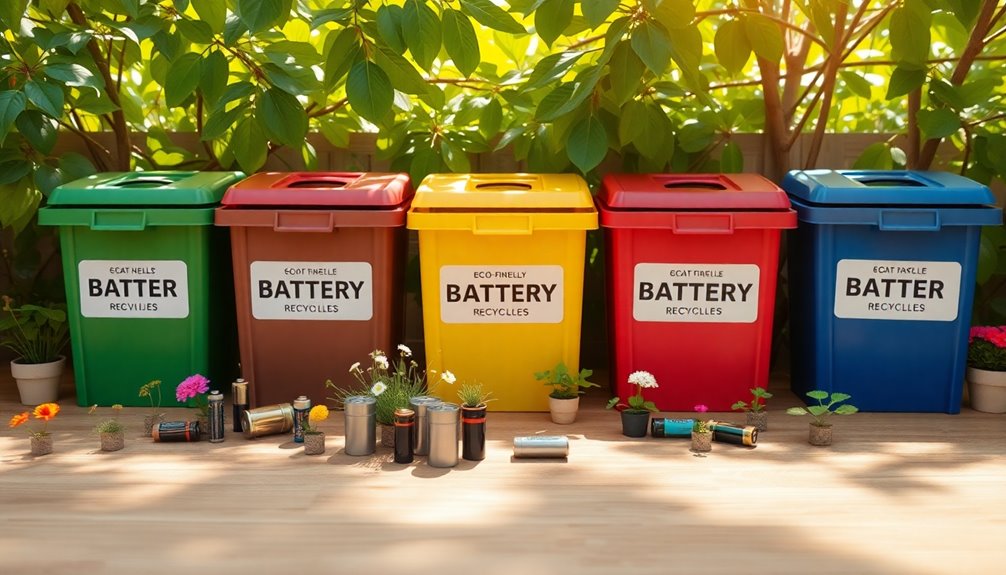
When you're ready to dispose of batteries, start by identifying the type you have, as different batteries require different methods.
Next, locate recycling centers or programs in your area to guarantee you're following local regulations.
Taking these steps helps you dispose of batteries safely and responsibly.
Identify Battery Types
Understanding the different types of batteries is essential for safe disposal.
Single-use batteries, like alkaline ones, are often accepted at local recycling centers and may even be tossed in the regular trash, but it's important to check your local guidelines.
Rechargeable batteries, such as lithium-ion and nickel-cadmium, should never go in the trash; return them to retailers with take-back programs or designated recycling spots.
Lead-acid batteries, found in vehicles, contain hazardous materials and must go to specialized recycling facilities.
For button cell batteries, which have toxic metals like mercury, recycle them at appropriate facilities or retailers.
Finally, always tape the terminals of lithium-ion batteries before disposal to avoid short-circuiting and fire hazards.
Locate Recycling Centers
Knowing how to dispose of batteries properly is just the first step; the next is finding the right place to recycle them.
Use resources like Call2Recycle and Earth911 to locate a battery recycling center near you that accepts various battery types, including lithium-ion and alkaline. Many local municipalities also organize hazardous waste collection events, where you can safely drop off your batteries.
Additionally, retailers such as Home Depot often partner with recycling programs, providing convenient drop-off bins.
Before heading out, remember to prepare your batteries by taping the terminals of lithium-ion batteries to prevent short-circuiting and storing them in a cool, dry place.
This way, you're ensuring eco-friendly disposal and protecting the environment.
Follow Local Regulations
To guarantee you're disposing of batteries safely and responsibly, it's essential to follow local regulations.
These rules vary by region, so check with local waste management authorities or municipal websites for specific guidelines. Many municipalities ban certain battery types, like lithium-ion and lead-acid, from regular trash to prevent environmental contamination.
Some areas even classify all household batteries, including alkaline ones, as hazardous waste, requiring proper disposal methods instead.
Look for local collection sites or recycling events organized by solid waste districts for convenient drop-off options.
Recycling Locations
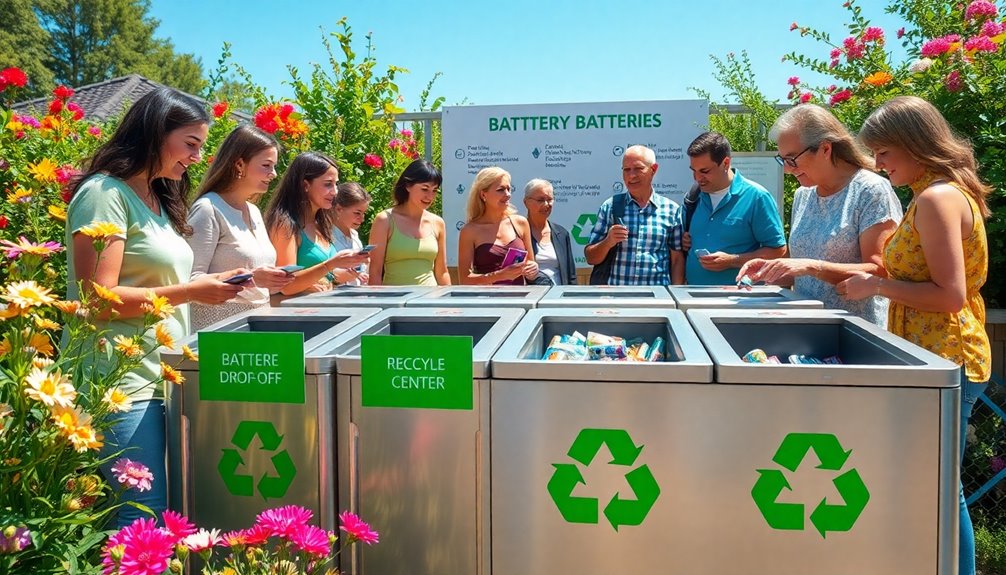
Where can you find reliable places to recycle your old batteries? Many retailers, like Home Depot and Best Buy, have teamed up with organizations like Call2Recycle to offer drop-off locations for various batteries, including lithium-ion and rechargeable types.
You can also check for local solid waste districts that organize battery collection events, making it easy for you to participate in community recycling efforts.
Don't forget that some manufacturers provide mail-in recycling programs, allowing you to send used batteries directly for proper disposal.
If you have lead-acid car batteries, auto care retailers often accept those for recycling, too.
For more options, visit online resources like Earth911 to locate nearby recycling centers and understand local disposal regulations.
Environmental Impact
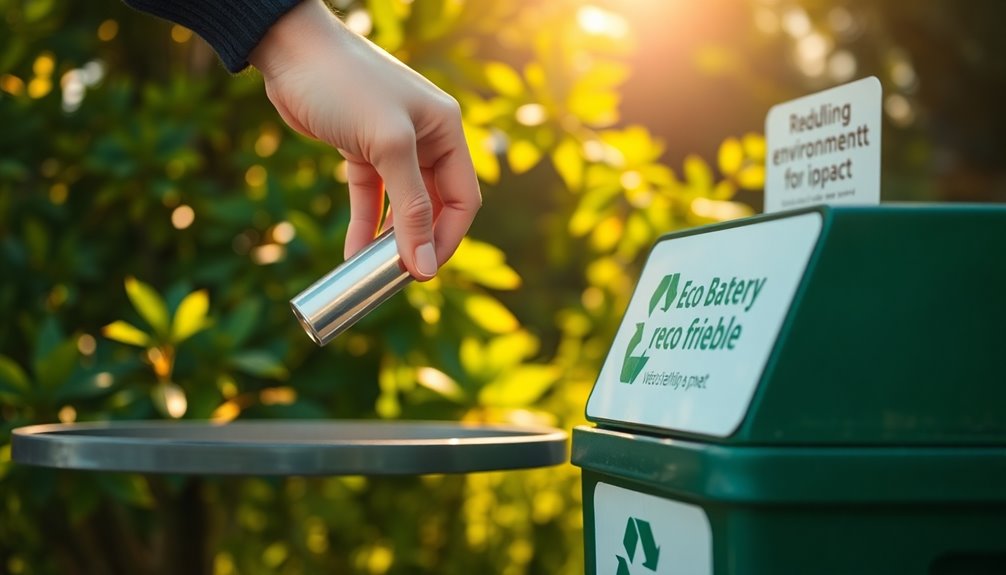
When you improperly dispose of batteries, toxic chemicals can leak into the ground, threatening both wildlife and ecosystems.
This contamination not only harms the environment but can also impact your health and the health of your community.
Toxic Chemical Leakage
Improper battery disposal can lead to toxic chemical leakage, posing significant risks to the environment.
Batteries contain hazardous materials like lead, cadmium, mercury, and lithium that can seep into the soil and water. When these toxic chemicals leak, they can contaminate groundwater, making it unsafe for drinking and harming aquatic ecosystems.
This contamination can even enter the food chain, affecting wildlife and potentially impacting human health. Additionally, incinerating batteries releases harmful gases, contributing to air pollution and associated health risks.
Research shows that only 5% of lithium-ion batteries were recycled globally in 2022, underscoring the urgent need for proper disposal methods to prevent widespread environmental risks and protect our planet's health.
Wildlife and Ecosystem Risks
Toxic chemical leakage from improperly disposed batteries poses a serious threat not just to human health, but also to wildlife and ecosystems.
When batteries leak hazardous substances like lead and mercury, they contaminate soil and water sources essential for wildlife survival. Aquatic life suffers as these toxins disrupt food chains, leading to declines in sensitive fish and other organisms.
Terrestrial wildlife isn't spared either; bioaccumulation of these toxins can cause serious health issues and reproductive problems, increasing mortality rates within affected populations.
Additionally, the release of harmful chemicals leads to habitat degradation, reducing biodiversity and disturbing the natural balance of ecosystems.
It's important to recognize that your disposal choices directly impact wildlife and the health of our environment.
Pollution From Improper Disposal
Disposing of batteries incorrectly can lead to significant environmental pollution that affects both ecosystems and public health. When you opt for improper disposal, toxic chemicals like lead, cadmium, and mercury can leach into the soil and groundwater, posing serious risks.
This contamination disrupts local wildlife and accumulates in the food chain, threatening biodiversity. Additionally, incinerating batteries releases harmful pollutants into the air, contributing to respiratory issues for nearby communities.
With only about 5% of lithium-ion batteries recycled globally in 2022, the gap in responsible disposal practices is alarming. The long-term environmental impact of these actions not only harms ecosystems but also leads to increased remediation costs, creating a cycle of damage you can help prevent through proper disposal methods.
Common Mistakes
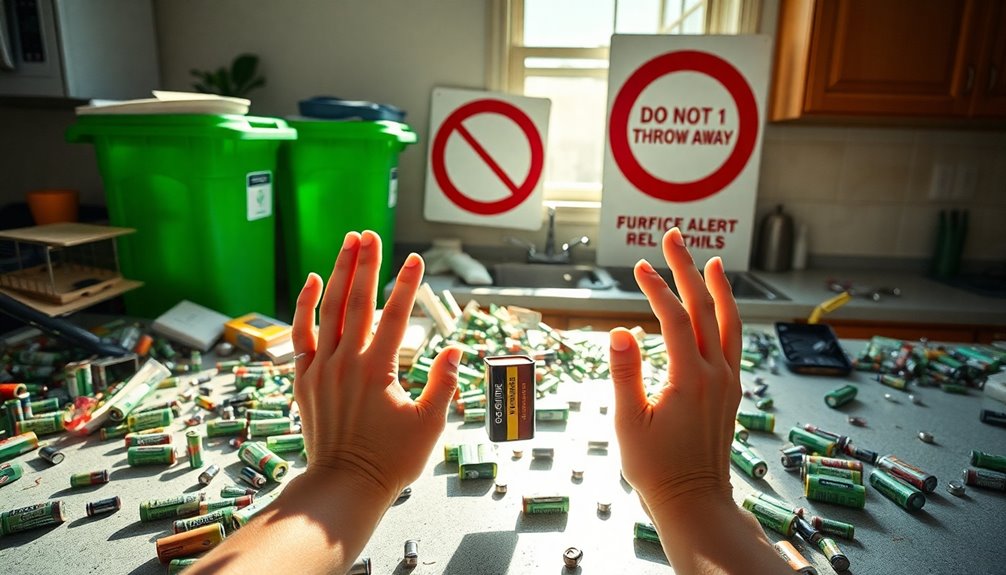
When it comes to battery disposal, many people unknowingly make critical mistakes that can harm both safety and the environment.
Here are some common mistakes you should avoid:
- Throwing lithium-ion batteries in regular trash – This can cause fire hazards and environmental contamination.
- Failing to tape 9-volt battery terminals – Uncovered terminals increase the risk of short-circuiting and fires.
- Mixing live and dead batteries – This can lead to leaks or dangerous reactions between different types.
- Ignoring local disposal regulations – Not following the rules can result in legal penalties and contribute to improper practices.
- Neglecting to consider the impact of pollutant reduction on public health – Proper battery disposal minimizes hazardous waste that can harm both the environment and community well-being.
Importance of Battery Recycling
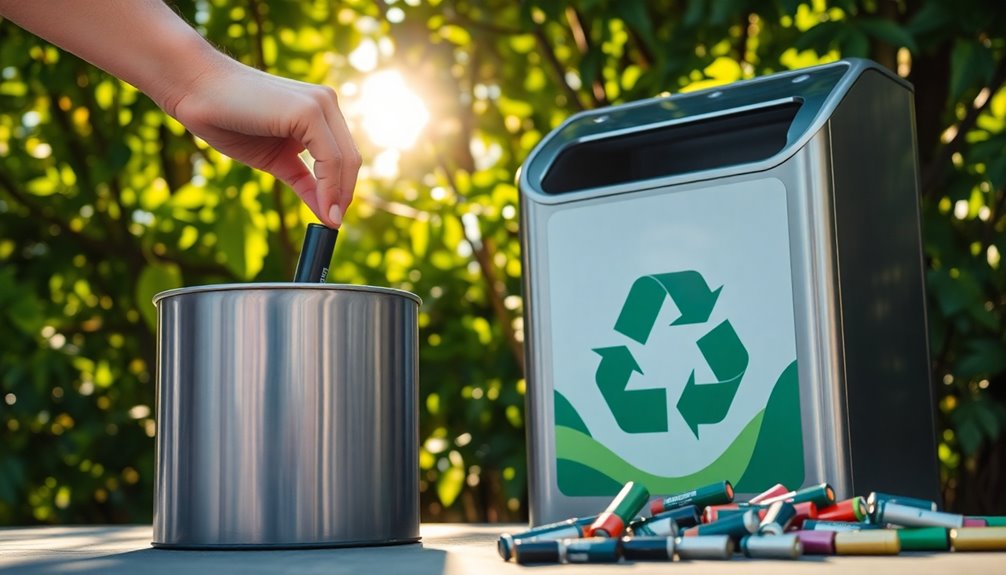
Battery recycling plays an essential role in protecting the environment and conserving natural resources, as it prevents harmful substances like lead and mercury from contaminating our soil and water.
With only 5% of lithium-ion batteries recycled globally in 2022, the need for proper disposal has never been more urgent. By recycling batteries, you not only recover valuable materials but also help extend the lifecycle of these resources, reducing the demand for new extraction.
This environmentally responsible practice greatly cuts air and water pollution, as incineration releases toxic gases that worsen climate change and health issues.
Supporting Extended Producer Responsibility (EPR) laws guarantees manufacturers manage battery waste properly, promoting sustainable practices for a cleaner, safer planet.
Frequently Asked Questions
How Should Batteries Be Disposed Of?
When it comes to disposing of batteries, you need to know the specifics for each type.
Alkaline batteries can usually go in the trash, but check your local rules first.
For lithium-ion and rechargeable batteries, always recycle them at designated locations to avoid environmental harm.
Car batteries should go back to auto retailers or specialized facilities.
Don't forget to tape the terminals of 9-volt batteries to prevent fire risks before disposal.
How Do I Dispose of Batteries in Wisconsin?
Imagine tossing your old batteries into a medieval dungeon—definitely not the right way to handle them!
In Wisconsin, you can usually throw household batteries in the trash, but it's best to check your local guidelines first.
Rechargeable batteries need recycling, so find a local retailer or use Call2Recycle.
Remember to tape the terminals of lithium-ion batteries to avoid short-circuits.
For hazardous waste, look for collection events in your county.
How Do You Dispose of Energizer Ultimate Lithium Batteries?
To dispose of Energizer Ultimate Lithium batteries, you shouldn't throw them in the regular trash.
Instead, check for local recycling centers or hazardous waste collection events. Many retailers like Home Depot offer drop-off programs through partnerships with organizations like Call2Recycle.
Before you go, make sure to tape the terminals to prevent short-circuiting.
Always verify your local regulations, as disposal methods can vary by region.
You're helping the environment by recycling!
Can You Put AA Batteries in General Waste?
When it comes to disposing of AA batteries, you've got to tread carefully.
While many regions allow you to toss them in general waste, some local regulations may classify them as hazardous. It's best to check your area's guidelines first.
If in doubt, recycling's the way to go. Many retailers offer drop-off options, so you can keep the planet in mind while you're at it.
Always tape the terminals to avoid short-circuits!
Conclusion
So, next time you think about tossing that old battery in the trash, imagine it sprouting legs and marching right back to haunt you in a toxic cloud. It's ironic, isn't it? By choosing eco-friendly disposal methods, you're not just saving the planet; you're avoiding a battery boogeyman. Embrace recycling and give those batteries a second chance, instead of letting them join the landfill's forgotten graveyard of hazardous waste. Your future self will thank you!

